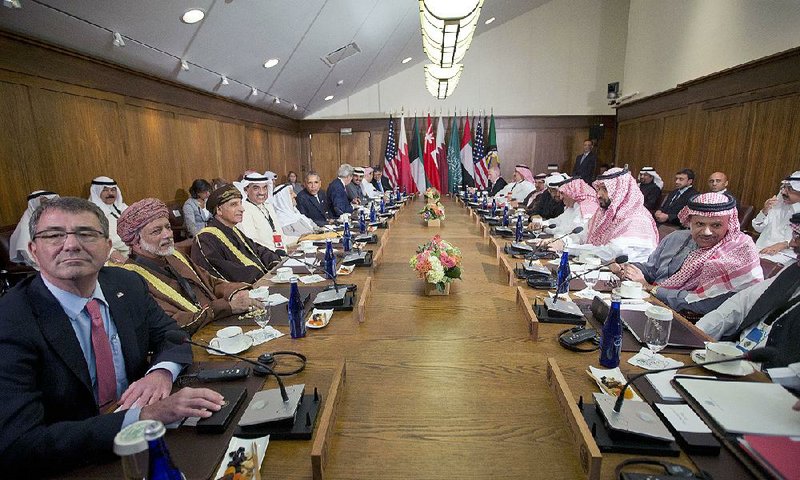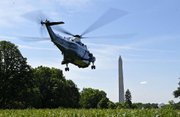CAMP DAVID, Md. -- President Barack Obama pledged America's "ironclad commitment" to anxious Persian Gulf nations Thursday to help protect their security, pointedly mentioning the potential use of military force and offering strong assurances that an international nuclear agreement with Iran would not leave them more vulnerable.
Obama promised that the U.S. would join with Gulf Cooperation Council nations "to deter and confront an external threat to any [Gulf Cooperation Council] state's territorial integrity."
Speaking at the close of a meeting with Persian Gulf leaders at the presidential retreat at Camp David, he expressed hope that the region would achieve "the kind of peace and good neighborliness with Iran that I think so many of the countries here seek."
A written annex accompanying a joint statement from the leaders laid out what Obama meant when he promised "our ironclad commitment to the security of our Gulf partners."
"The United States policy to use all elements of power to secure our core interests in the Gulf region, and to deter and confront external aggression against our allies and partners, as we did in the Gulf War, is unequivocal," it said.
While the U.S. has long provided military support to partners in the Persian Gulf, the statement pledged new cooperation on counterterrorism, maritime security, cybersecurity and ballistic missile defense, among other things.
Obama's separate negotiations in recent months to curb Iran's nuclear program in exchange for sanctions relief have strained relations with many of America's traditional partners in the region. Persian Gulf states fear that if Iran gets an influx of money when sanctions are lifted, it will embolden what they see as Tehran's aggression in the region.
Obama, at his summit-closing news conference, said that while the leaders hadn't been asked to "sign on the bottom line" to approve the work-in-progress nuclear deal, they did agree "that a comprehensive, verifiable solution that fully addresses the regional and international concerns about Iran's nuclear program is in the security interests of the international community, including our GCC partners."
Saudi Foreign Minister Adel al-Jubeir called Thursday a productive day. He said the Arab leaders were "assured that the objective is to deny Iran the ability to obtain a nuclear weapon" and that all pathways to such a weapon would be cut off.
He added that it was too early to know if a final nuclear agreement would be acceptable, saying, "We don't know if the Iranians will accept the terms they need to accept."
As the leaders gathered, an Iranian naval patrol boat fired on a Singapore-flagged commercial ship in the Persian Gulf in an apparent attempt to disable it over a financial dispute over damage to an Iranian oil platform, a U.S. official said.
The Iranians initially fired warning shots Thursday after the MT Alpine Eternity refused to move into Iranian waters.
The incident took place a bit south of the island of Abu Musa just inside the Persian Gulf, said the U.S. official, who was not authorized to discuss details by name. The White House said no Americans were involved in the incident.
After the warning shots were fired the ship began heading toward territorial waters of the United Arab Emirates, and the Iranians then opened up with machine gun fire, according to the U.S. official. The official said early reports indicated no one aboard the ship was injured.
In response to a call for help from the Alpine Eternity, the United Arab Emirates coast guard responded and the Iranian patrol vessels left the area.
Officials at Transpetrol, the Singapore-flagged ship's manager, said they had no immediate information.
The U.S. official said the Alpine Eternity is involved in a financial dispute with Tehran. The Alpine Eternity on March 22 accidentally struck an Iranian oil platform, damaging it. The ship, which also was damaged in the accident, went into port for repairs, and during that period the Iranians informed the shipping company that it must pay for damage to the oil platform.
With the dispute apparently unsettled, the Iranians confronted the Alpine Eternity near Abu Musa island, the U.S. official said. The dispute escalated from there. The U.S. official said the U.S. Navy communicated with the Alpine Eternity after the Iranians fired at it, but by the time the circumstances became clear the incident was over, and no U.S. ships were dispatched to the scene. The U.S. maintains a constant aircraft carrier presence in the Persian Gulf area.
Ben Rhodes, Obama's deputy national security adviser, said that while the incident did not come up in Thursday's discussions, it was "exactly the type of challenge" the Persian Gulf nations are focused on.
Al-Jubeir, for his part, said: "The Iranians should not be allowed to get away with it. ... For whatever reason they're doing it, it's got to stop."
Obama rarely uses Camp David for personal or official business. White House aides hoped the more intimate setting would lead to a more candid conversation with the Arab allies.
Just two other heads of state -- the emirs of Qatar and Kuwait -- joined Obama at Camp David. Saudi Arabia, the United Arab Emirates, Oman and Bahrain all sent representatives.
The Persian Gulf summit comes as the U.S. and five other nations -- the United Kingdom, China, France, Germany and Russia -- work to reach an agreement with Iran by the end of June. The White House says a nuclear accord could clear the way for more productive discussions with Iran about its reputed terror links.
The U.S. has criticized Iran's support for Hezbollah, as well as attacks carried out by Iran's Quds Force. In 2011, the Obama administration accused Iran of plotting to kill the Saudi ambassador to the United States in Washington.
The Saudis are also particularly concerned about the situation in Yemen, where Houthi rebels with ties with Iran have ousted the U.S.- and Saudi-backed leader.
For more than a month, a Saudi-led coalition has tried to push back the Houthis with a bombing campaign. On Tuesday, a five-day humanitarian cease-fire went into effect.
Information for this article was contributed by Robert Burns, Adam Schreck and Bradley Klapper of The Associated Press.
A Section on 05/15/2015

